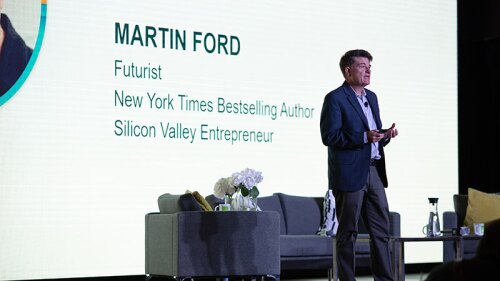ULI’s 2017 Annual Report highlights member-driven accomplishments and impact that occurred in fiscal year 2017 (July 1, 2016–June 30, 2017). The report also presents the perspectives of ULI’s global leadership through a series of video dialogues in which participants reflect on a range of topics, including what ULI has meant to them personally and professionally, ULI programs and initiatives they are passionate about, and new growth opportunities for the Institute around the world.
One of the dialogues features ULI Global Chairman Tom Toomey in conversation with Michael Spies, senior managing director, Tishman Speyer, and a ULI global governing trustee who helped establish the Institute’s presence in Europe. Toomey and Spies are part of a ULI working group looking at how the Institute can more fully engage with corporate members. They spoke about this initiative as well as the role that ULI has played in shaping their careers. Here is an excerpt of their conversation; the full video, along with conversations between other key ULI leaders, may be seen at annualreport.uli.org/leaders.
Tom Toomey: One of the things as global chair that I am always concerned about is not to lose our culture of openness and transparency, but how to continue to just listen to members and make the model work for them. For 70 years, ULI has been very focused on individuals, and as we’ve expanded, we’ve started to engage more with corporations. Now, we have arrived at a corporate membership/sponsorship [package] and it is staggering to look at their contribution—there are over 2,000 corporate members—and one of the challenges we’ve had is how to do better for them.
Michael Spies: One of the great potentials is that any corporate member has within its own mission elements of ULI’s mission. It may not have its mission defined in the same way as ULI does, but it has aspects of the mission that are absolutely community focused, and get at that very much through engaging with ULI. Something like UrbanPlan—there is nothing like having an engagement with a local school through UrbanPlan. In terms of looking to do in any of the markets where we are active, that pretty much embodies it. The individuals in the team get to engage with the kids. It is sort of a win/win all around.
Toomey: UrbanPlan is a great example of connecting our corporate members and listening to them, and giving them an opportunity to advance their own mission and aspirations that fit inside ULI’s aspirations. We recently had a listening tour with our corporate members, and it was very revealing.
Spies: Depending on your business and where you are present, it makes sense to engage locally, and to try to tie together a more strategic relationship globally.
Toomey: When we’ve stepped back and looked at the power of ULI, the biggest thing that jumps off the page at us is how to get our members all the tools they need to leap forward and have solutions. What I think is great about it is that it’s building on our sharing mind-set—the culture, if you will, of ULI—and overlaying on that the tools necessary to do it.
Spies: [Tishman Speyer] has been building an international presence for 30 years and long ago learned that it is just not a matter of exporting our knowledge, but importing a lot of experience that we just don’t [have] and a different perspective of looking at stuff. We’ve become a much better company as a result. ULI in the same way is a place where people can engage and consider new geographies for their own businesses, and learn about other people’s experiences.
Toomey: What I always find is a great conversation starter is the simple question: ULI—what has it meant to you? I always find it a tough question; it’s meant so much to me. What’s it meant to you?
Spies: I first learned about ULI when I was in graduate school, or possibly undergrad. Much of my journey has been an international journey, and it has sort of been in parallel with ULI’s international journey, and that’s been very gratifying to me. You’re building, you’re engaging with multiple cultures all the time, you’re learning that different systems work in different ways. For me personally, it’s been a very fulfilling journey with ULI.
Toomey: To me, you are almost a poster child for international because you have made it happen. It is people like you who said I’m going to use the ULI connection and the beauty of it, the transparency of it, the access to it, to expand an international business, and you have helped us grow [ULI’s membership] certainly. Now, Asia is over 2,000 members; Europe, 2,500, almost 3,000; and a lot of that is under your stewardship, leadership, engagement.
My story is a little bit different. I started in my thirties, and what was entertaining about it was that I was invited by a peer to present a deal I had done on a panel. And I was pretty damn proud of it. I said, “I’ve done this deal, I’m pretty proud of my return,” and it was an honest exchange and assessment by people I admired who said I could have done more. I didn’t think of that. And so, it was the honesty of feedback that drew me in.
In my thirties, [ULI] was a great venue for meeting the right bankers, meeting the right developers, listening to new ideas. And now as I get into my fifties, it’s about bringing the people in my company up to speed on the value of being able to share and learn in an open culture. We are tackling the social aspects of [cities], the economic aspects of [cities]. We’re making better cities around the globe. And that’s exciting at this stage in my life.
Watch this video dialogue as well as others at annualreport.uli.org/leaders. Learn more about ULI’s 2017 accomplishments at annualreport.uli.org.


